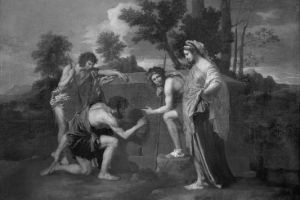Concert
Collegium Vocale Gent
Philippe Herreweghe, conductor
Et in Arcadia Ego
Marenzio / Monteverdi / Rossi and others

Nicolas Poussin’s “The Arcadian Shepherds” from 1638 is one of the most prominent Baroque depictions of the phrase “Et in Arcadia ego”
Arcadia is the land of eternal sunshine and unclouded joy – but death also afflicts those who dwell there. A musical memento mori: in an affecting programme of vocal music, Collegium Vocale Gent conducted by Philippe Herreweghe explores the sound worlds of the late Renaissance and early Baroque.
“Et in arcadia ego”: I too was in Arcadia – this well-known phrase was first encountered in the visual arts in a work by the Baroque painter Guercino, written on a stone plinth supporting a human skull that two shepherds stare at in contemplative horror. A memento mori that offers the viewer striking visual evidence that even in Arcadia, death will have the last word. Now “Et in arcadia ego” is the title for Philippe Herreweghe and his brillant Collegium Vocale Gent’s varied vocal programme focusing on Italian madrigals, motets and canzonette from the end of the 16th and beginning of the 17th centuries. It includes works by the Renaissance master Luca Marenzio, worshipped by his contemporaries as “Italy’s sweetest swan” for his sublime madrigal compositions that skilfully transpose the set texts into sonic form. And of course, there is also music by Marenzino’s contemporary Claudio Monteverdi, who was primarily responsible for the madrigal’s heyday as a passionate lament for the joys and sorrows of love, life and death at the end of the 16th century. A particular highlight will be the works of Salomone Rossi, who sought to create similar music for the synagogue to that which the Venetian maestro di cappella Monteverdi performed in St. Mark’s Cathedral. In 1622 he published the collection “Hashirim asher lish’lomo” (The Songs of Salomon) containing Hebrew psalms, hymns and prayers in the ornate Italian polyphony of the period: at the time a pioneering historical achievement, now a genuine musical rediscovery!
Programme
Et in Arcadia Ego
Italian madrigals / polyphonic music of the 16th century
Introduction
Salomone Rossi (1570 – 1630)
Sinfonia à 5
Giovanni Giacomo Gastoldi (1550 – 1609)
Concerto de Pastori
Separation
Salomone Rossi
Sinfonia grave à 5
Udite, lagrimosi Spirti
Luca Marenzio (1553 – 1599)
Stillo l’anima in Pianto
Salomone Rossi
Sinfonia quinta
Claudio Monteverdi (1567 – 1643)
Ah, dolente partita
Intimacy
Salomone Rossi
Gagliarda à 5 detta Narciso
Corrente Seconda
Brando primo
Sigismondo d’India (1582 – 1629)
Dialogo della Rosa
Salomone Rossi
Sinfonia Undecima (Echo)
Luca Marenzio
Deh Tirsi mio gentil
Claudio Monteverdi
Dolcemente dormiva
Luca Marenzio
Al lume delle stelle
Death
Salomone Rossi
Sinfonia Seconda
Salomone Rossi
Tirsi mio, caro Tirsi
Luca Marenzio
Nel dolce seno
Marenzio/Bassano/Philips
Tirsi morir volea
The Lovers Reunited
Claudio Monteverdi
Ballo Tirsi e Clori
Contributors
Miriam Allan – soprano
Barbora Kabátková – soprano
Martha McLorinan – alto
Benedict Hymas – tenor
Nicholas Mulroy – tenor
Jimmy Holliday – bass
Sophie Gent – violin
Anna Pekkala – violin
Ageet Zweistra – viola
Jonas Nordberg – lute
Lambert Colson – cornetto
Bart Vroomen – trombone
Maude Gratton – harpsichord
Collegium Vocale Gent
Philippe Herreweghe – conductor
An event by Berliner Festspiele / Musikfest Berlin